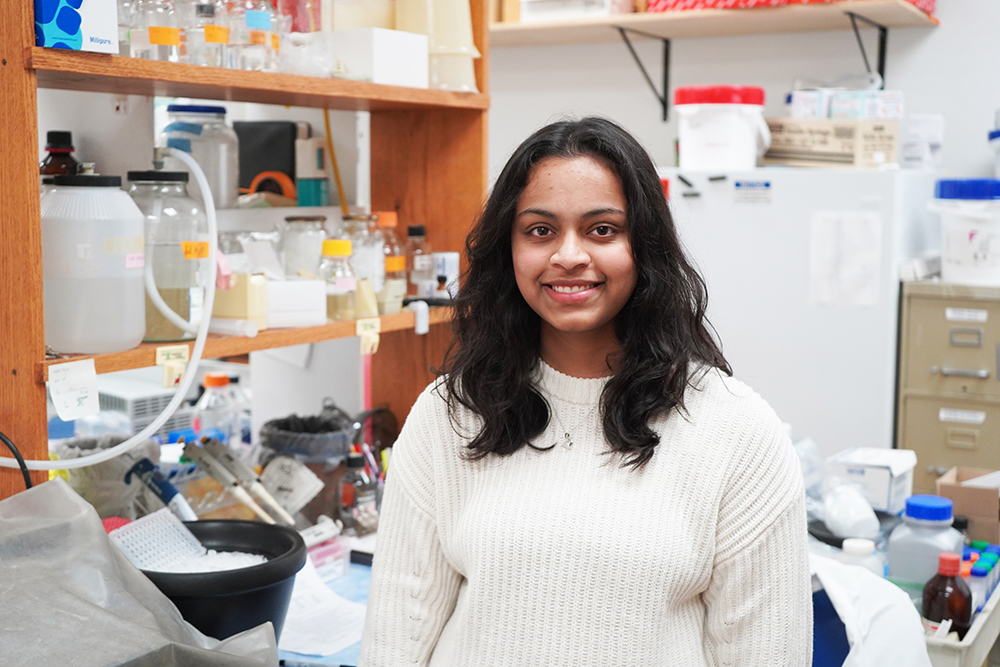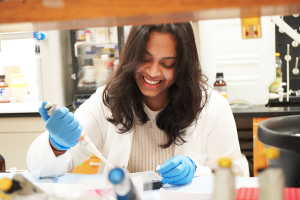
While Anvitha Boosani never officially toured the University of Missouri campus, she knew Mizzou was going to be the perfect fit for her. That feeling came from her familiarity with a single building – the Animal Science Research Center.
Boosani got acquainted with the space as a high school student. At just 16 years old, she applied for and received a grant from the National Tri-Services (Army, Navy and Air Force) to conduct her own independent research project. She was living in Nebraska at the time, but her father had just moved to Columbia to work as an assistant research professor at MU. Boosani soon found herself in the lab of Jonathan Green, an associate professor in the Division of Animal Sciences, and began her research project in June 2021. It’s the lab she continued to work in during her first year as a Tiger.
“I was very fortunate to find Dr. Green,” said Boosani, a biochemistry major who just finished her freshman year at MU. “He has been so helpful and provided me with great guidance as I got started.”
When Boosani discusses her research journey, she likes to joke that she was essentially born in a laboratory.
Growing up in Omaha, her parents, who were both scientists at the Boys Town National Research Hospital, worked in labs right next to each other. Boosani spent a good portion of her childhood in both spaces, and she soon found her own passion for research. It was that interest that led her to apply for her first grant.
“I definitely grew up in a very scientific environment,” Boosani said. “I did branch out a bit to see what else was out there, but I always came back to research. I love everything about it. There’s just so much room for discovery, and it’s exciting to explore complicated questions.”
Boosani also had the opportunity to explore research projects taking place at Creighton University. She dove into research a bit deeper as a high school student, observing cardiovascular-focused labs on campus. It was during that time that her first independent research idea blossomed.

One of the labs Boosani observed focused on atherosclerosis, which is a disease involving the buildup of fats, cholesterol and other substances in the artery walls, causing the formation plaques. When immune cells, known as macrophages, encounter these buildups, they enter the plaques and attempt to remove the cholesterol but become saturated and turn into foam cells, which accumulate in the plaques and contribute to their growth. The mechanism causes arteries to narrow and block blood flow. Boosani thought it would be interesting to take the principles of CAR T-cell therapy, a much-talked-about topic at the time she was researching her proposal, and apply it to atherosclerosis. CAR T-cell therapy is a form of immunotherapy that uses specially altered T cells, which are part of the immune system.
“My grant proposal pulled ideas from my observations in that lab, as well as my own personal interests,” Boosani said. “As I saw the research behind engineering immune cells in cancer, I thought it would be interesting to see if we could try the same thing in atherosclerosis.”
Boosani built on her project during her first year at Mizzou and is continuing her work this summer after being named a Cherng Summer Scholar. A full-time, nine-week summer research or creative scholarship program for Honors College students, the Cherng Summer Scholars program is supported by a gift from Peggy and Andrew Cherng and the Panda Charitable Foundation. Recipients receive a $7,000 award and access to a $1,000 project expense account.
“It’s been really nice to interact with the other Scholars and nerd out about our work,” Boosani said. “It’s also enjoyable to see their thought processes and explore our passions together. We’re building friendships and the entire experience has been amazing.”
One of the proteins that Boosani was interested in when she first began her project was histone deacetylase 10, or HDAC10, a protein that is involved in epigenetic gene regulation through modulating cell survival mechanisms. As she continues her research this summer, she is still working with HDAC10, but also looking beyond that single protein.
“I knew what role HDAC10 played in atherosclerosis through my earlier work,” Boosani said. “I wanted to look at other proteins to see if they are involved in the disease and if they interact with HDAC10. There are a few that do, and all of these are classified under a group called epigenetic proteins. These proteins regulate gene expression outside of what an individual inherits from their parents.”
Boosani said that these proteins can play a role in causing plaque buildup, too.
“Essentially, epigenetic proteins can do many things,” she said. “The same protein that can methylate DNA or deacetylate a histone can also contribute to a mechanism that leads to immune responses that, in this case, can be harmful in certain conditions. It’s really interesting because these responses would normally be beyond our control, but we can modify gene expression to see how those mechanisms change.”
Boosani is currently on the pre-medicine track within the biochemistry degree. While she is still passionate about research, she wants to keep her options open for her future.
“I want to see where I fit in best before I make a long-term commitment,” Boosani said. “It’s important to get your feet wet before you jump in. I want to take in in multiple experiences before I decide. The exciting part for me is that Mizzou is able to provide all those experiences. I’m so glad that made the decision to come here.
“I am also thankful for my supervisor, Dr. Green, for giving me the opportunity to pursue an independent project in his lab and for all his guidance. I also want to thank Benjamin Nelson, a graduate student in the lab, for his help and support.”